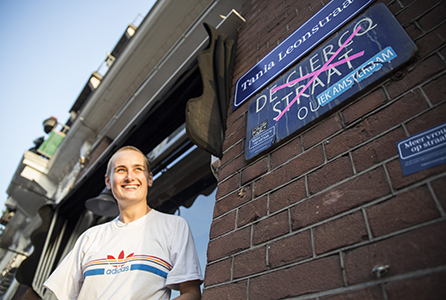Writing women back into street signs
Whilst many road names named after people honour important individuals in history, there is an issue with representation - most of them are named after men.

Wednesday, 16 Jan 2019 12:04 GMT

Making a mark for women. Photo: Judith Tielemans
According to De Correspondent, of the 5,419 streets in Amsterdam, 2,014 are named after people. 1,770 of those are men, meaning 88% of street names named after a person, are named after a man.
One group is taking matters into their own hands and are adding their own road signs to recognise important women in history. De Bovengrondse, which translates as ‘above ground’, is a Dutch group working for gender equality.
Santi van den Toorn, a co-founding member of De Bovengrondse, says the campaign aims to highlight the disproportionate representation of men in public spaces. “Women, trans-people, and people of colour are barely represented. A society shows what they think is worth honouring through street names,” she says.
The group made their own signs, imitating the blue and white of Amsterdam’s street signs and displayed them underneath the original to highlight the change. The Ferdinand Bolstraat street, named after the artist in 1872, was transformed to Mies Bouwmanstraat to honour the famous Dutch TV presenter and author.

Founding member of the group, Santi van den Toorn, helps to change the signs. Photo courtesy of De Bovengrondse
A study by Mapbox analysed street names in London, Mumbai, Paris, San Francisco, New Delhi, Bengaluru, Chennai, and found that of all of the streets named after people, on average just 27.5% were named after women.
The study also revealed that there was a stark difference in the types of roads that were named after women in comparison to those named after men. Aruna Sankaranarayanan, who lead the study, comments: “The results are fascinating, and maybe not surprising: streets named after men are more numerous and more centrally located than streets named after women in the metro areas we analysed.”
Russell Square in London was changed to Pankhurst Square for a day in March of last year by human rights lawyers at Doughty Street, to honour the work of local suffragettes and suffragists who helped secure women the vote.
Van den Toorn adds: “It also shows that history is written by and about men, because we have provided numerous [examples] of awesome women that, in our opinion, qualify for a street name as well.

A society shows what they think is worth honouring through street names”
"By campaigning in this way, we aim to reach a broad public and create awareness of how inequality is still embedded in all parts of our society. [It’s] often so sneaky that you don’t think about it; street names, lack of public toilets for women etc.”
How have locals responded? “A lot of people responded very positively,” says van den Toorn. “Many people had never thought about it, a lot of people started thinking of cool women that should be honoured.
"Meanwhile, many of our local governments (at the municipal level) have taken steps to advance the amount of street names being named after women.
“We are happy with all this attention and the actual concrete outcomes and changes that it has entailed. Of course, as with everything these days, there were people that find it unimportant and exaggerated.”
If you have a news story, email summer@linkpublishing.co.uk or follow us on Twitter to have your say.